MGT723 Research Project: Stakeholder Theory & Carbon Disclosure
VerifiedAdded on 2023/06/14
|10
|1592
|251
Report
AI Summary
This research proposal investigates the effect of stakeholder theory on carbon disclosure reporting within companies. It begins with a literature review, outlining practical and theoretical motivations for the study, defining stakeholder theory, and identifying key theoretical constructs, dependent (voluntary reduction targets), and independent variables (stakeholder power). A conceptual model is presented, illustrating the relationships between these variables, leading to the formulation of testable hypotheses regarding the association between stakeholder power and voluntary reduction targets, responses of low-powered organizations to powerful stakeholders, and the role of suppliers in complex emission targets. Proxy measures for the theoretical constructs are defined. The research method section details the use of a quantitative approach, employing both primary and secondary data, simple random sampling of 34 managers from UK companies, and data analysis using MS Excel to assess the impact of climate change on stakeholders. The proposal includes an open-ended questionnaire for gathering relevant data from managers regarding their companies' stakeholder theory practices and environmental sustainability initiatives. The goal is to find reliable findings associated with companies' stakeholder theory practice and addressing accounting issues related to environmental sustainability.
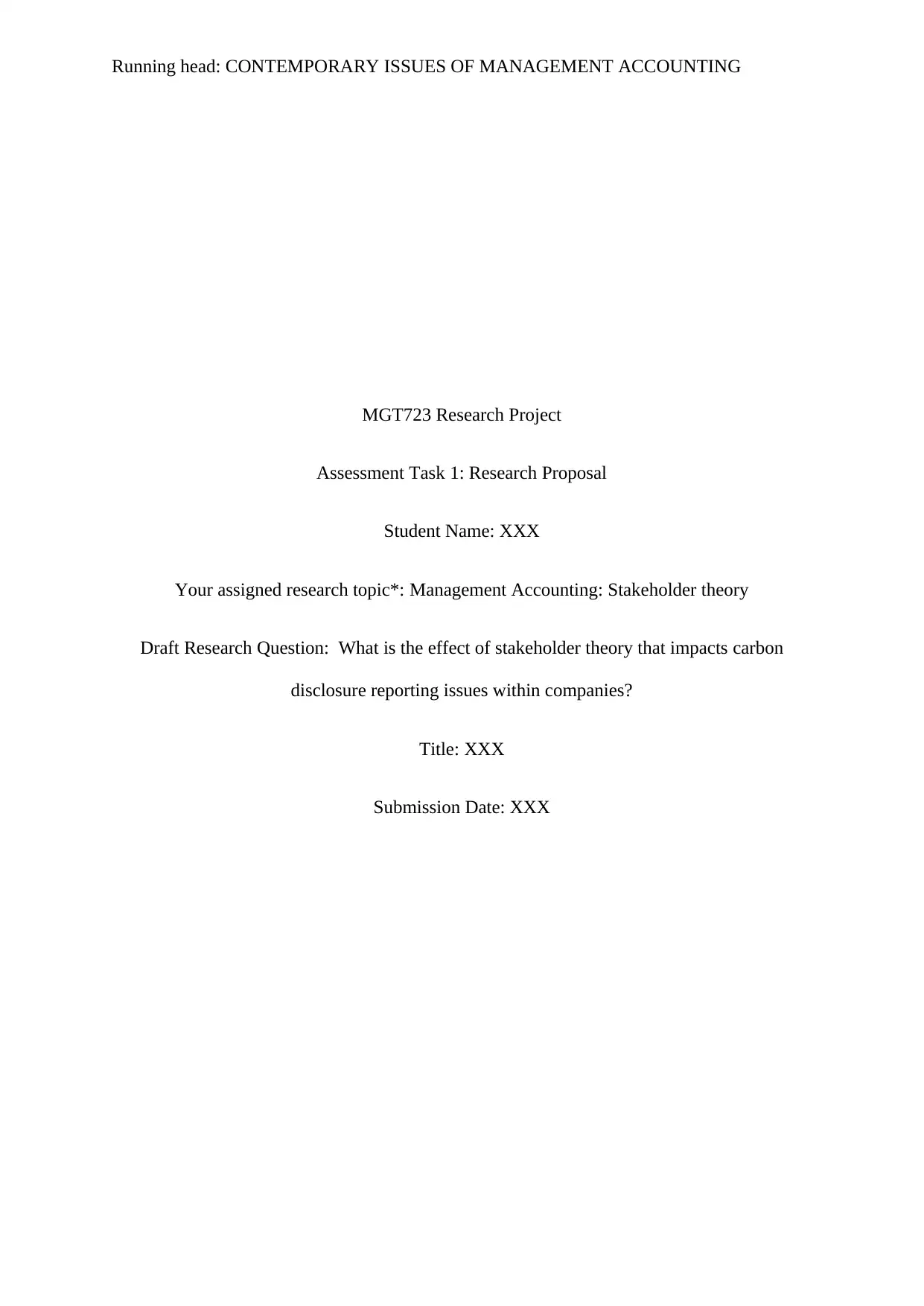
Running head: CONTEMPORARY ISSUES OF MANAGEMENT ACCOUNTING
MGT723 Research Project
Assessment Task 1: Research Proposal
Student Name: XXX
Your assigned research topic*: Management Accounting: Stakeholder theory
Draft Research Question: What is the effect of stakeholder theory that impacts carbon
disclosure reporting issues within companies?
Title: XXX
Submission Date: XXX
MGT723 Research Project
Assessment Task 1: Research Proposal
Student Name: XXX
Your assigned research topic*: Management Accounting: Stakeholder theory
Draft Research Question: What is the effect of stakeholder theory that impacts carbon
disclosure reporting issues within companies?
Title: XXX
Submission Date: XXX
Paraphrase This Document
Need a fresh take? Get an instant paraphrase of this document with our AI Paraphraser
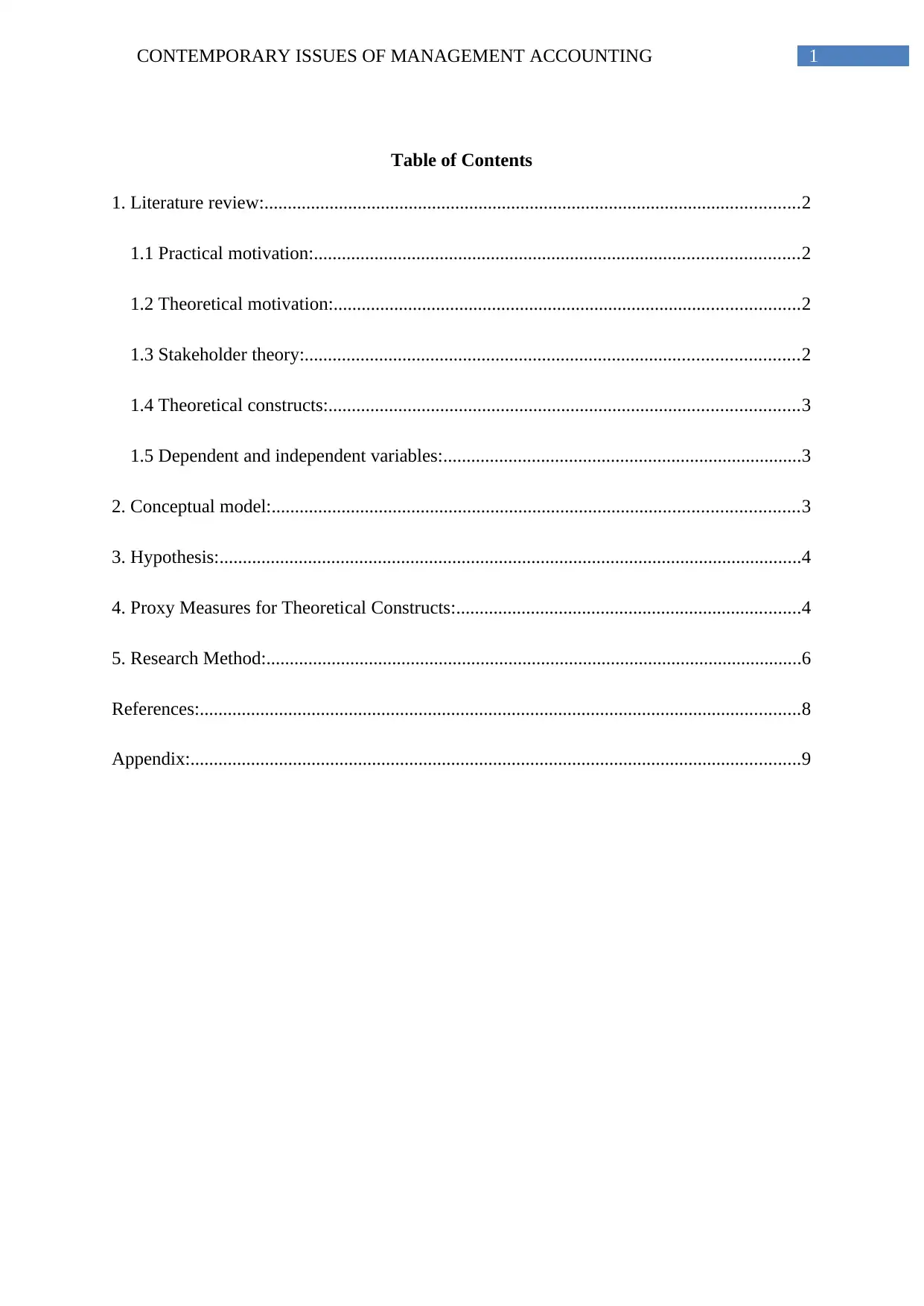
1CONTEMPORARY ISSUES OF MANAGEMENT ACCOUNTING
Table of Contents
1. Literature review:...................................................................................................................2
1.1 Practical motivation:........................................................................................................2
1.2 Theoretical motivation:....................................................................................................2
1.3 Stakeholder theory:..........................................................................................................2
1.4 Theoretical constructs:.....................................................................................................3
1.5 Dependent and independent variables:.............................................................................3
2. Conceptual model:.................................................................................................................3
3. Hypothesis:.............................................................................................................................4
4. Proxy Measures for Theoretical Constructs:..........................................................................4
5. Research Method:...................................................................................................................6
References:.................................................................................................................................8
Appendix:...................................................................................................................................9
Table of Contents
1. Literature review:...................................................................................................................2
1.1 Practical motivation:........................................................................................................2
1.2 Theoretical motivation:....................................................................................................2
1.3 Stakeholder theory:..........................................................................................................2
1.4 Theoretical constructs:.....................................................................................................3
1.5 Dependent and independent variables:.............................................................................3
2. Conceptual model:.................................................................................................................3
3. Hypothesis:.............................................................................................................................4
4. Proxy Measures for Theoretical Constructs:..........................................................................4
5. Research Method:...................................................................................................................6
References:.................................................................................................................................8
Appendix:...................................................................................................................................9
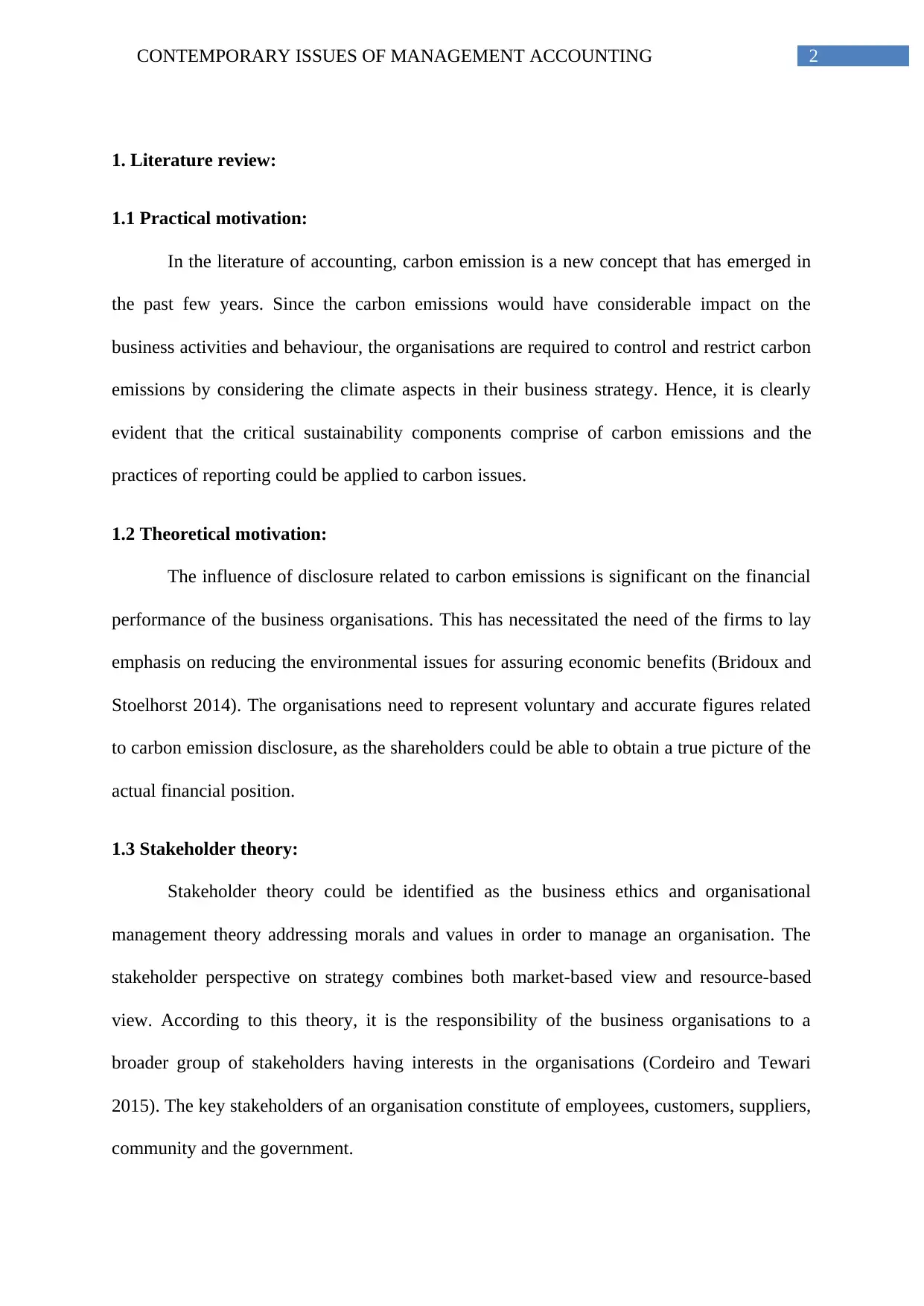
2CONTEMPORARY ISSUES OF MANAGEMENT ACCOUNTING
1. Literature review:
1.1 Practical motivation:
In the literature of accounting, carbon emission is a new concept that has emerged in
the past few years. Since the carbon emissions would have considerable impact on the
business activities and behaviour, the organisations are required to control and restrict carbon
emissions by considering the climate aspects in their business strategy. Hence, it is clearly
evident that the critical sustainability components comprise of carbon emissions and the
practices of reporting could be applied to carbon issues.
1.2 Theoretical motivation:
The influence of disclosure related to carbon emissions is significant on the financial
performance of the business organisations. This has necessitated the need of the firms to lay
emphasis on reducing the environmental issues for assuring economic benefits (Bridoux and
Stoelhorst 2014). The organisations need to represent voluntary and accurate figures related
to carbon emission disclosure, as the shareholders could be able to obtain a true picture of the
actual financial position.
1.3 Stakeholder theory:
Stakeholder theory could be identified as the business ethics and organisational
management theory addressing morals and values in order to manage an organisation. The
stakeholder perspective on strategy combines both market-based view and resource-based
view. According to this theory, it is the responsibility of the business organisations to a
broader group of stakeholders having interests in the organisations (Cordeiro and Tewari
2015). The key stakeholders of an organisation constitute of employees, customers, suppliers,
community and the government.
1. Literature review:
1.1 Practical motivation:
In the literature of accounting, carbon emission is a new concept that has emerged in
the past few years. Since the carbon emissions would have considerable impact on the
business activities and behaviour, the organisations are required to control and restrict carbon
emissions by considering the climate aspects in their business strategy. Hence, it is clearly
evident that the critical sustainability components comprise of carbon emissions and the
practices of reporting could be applied to carbon issues.
1.2 Theoretical motivation:
The influence of disclosure related to carbon emissions is significant on the financial
performance of the business organisations. This has necessitated the need of the firms to lay
emphasis on reducing the environmental issues for assuring economic benefits (Bridoux and
Stoelhorst 2014). The organisations need to represent voluntary and accurate figures related
to carbon emission disclosure, as the shareholders could be able to obtain a true picture of the
actual financial position.
1.3 Stakeholder theory:
Stakeholder theory could be identified as the business ethics and organisational
management theory addressing morals and values in order to manage an organisation. The
stakeholder perspective on strategy combines both market-based view and resource-based
view. According to this theory, it is the responsibility of the business organisations to a
broader group of stakeholders having interests in the organisations (Cordeiro and Tewari
2015). The key stakeholders of an organisation constitute of employees, customers, suppliers,
community and the government.
⊘ This is a preview!⊘
Do you want full access?
Subscribe today to unlock all pages.

Trusted by 1+ million students worldwide

3CONTEMPORARY ISSUES OF MANAGEMENT ACCOUNTING
1.4 Theoretical constructs:
The main theoretical constructs in this research comprise of the stakeholder theory
and the targets of carbon emission. The stakeholder theory would aim to discuss the
voluntary disclosure depending on the pressure that the powerful stakeholders exert on the
organisations. In this case, the organisations that do not possess considerable power are likely
to carry out the business functions for fulfilling the needs and interests of the shareholders
(Hörisch, Freeman and Schaltegger 2014).
1.5 Dependent and independent variables:
The dependent variable could be defined as something, which is tested and gauged in
a scientific experiment. The independent variable, on the contrary, is the variable that is
controlled or changed in a scientific experiment for testing the influence on the dependent
variable. In this case, the dependent variable will be considered in the form of target related
to voluntary reduction, while the independent variable will be adjudged as the power of the
stakeholders of the business organisations.
2. Conceptual model:
For formulating the research hypothesis, it is necessary to develop the conceptual
framework. It depends on the sustainable process of reporting and carbon disclosure having
integrated reporting factors. The crucial stakeholders need to be realised for gaining an
insight of the contributions to the processes of accounting and reporting. In addition, the
conceptual framework would constitute of both the dependent and independent variables
associated with the research. With the help of this framework, it would be possible to develop
between the carbon disclosures of the business organisations and their effects on the
stakeholders.
1.4 Theoretical constructs:
The main theoretical constructs in this research comprise of the stakeholder theory
and the targets of carbon emission. The stakeholder theory would aim to discuss the
voluntary disclosure depending on the pressure that the powerful stakeholders exert on the
organisations. In this case, the organisations that do not possess considerable power are likely
to carry out the business functions for fulfilling the needs and interests of the shareholders
(Hörisch, Freeman and Schaltegger 2014).
1.5 Dependent and independent variables:
The dependent variable could be defined as something, which is tested and gauged in
a scientific experiment. The independent variable, on the contrary, is the variable that is
controlled or changed in a scientific experiment for testing the influence on the dependent
variable. In this case, the dependent variable will be considered in the form of target related
to voluntary reduction, while the independent variable will be adjudged as the power of the
stakeholders of the business organisations.
2. Conceptual model:
For formulating the research hypothesis, it is necessary to develop the conceptual
framework. It depends on the sustainable process of reporting and carbon disclosure having
integrated reporting factors. The crucial stakeholders need to be realised for gaining an
insight of the contributions to the processes of accounting and reporting. In addition, the
conceptual framework would constitute of both the dependent and independent variables
associated with the research. With the help of this framework, it would be possible to develop
between the carbon disclosures of the business organisations and their effects on the
stakeholders.
Paraphrase This Document
Need a fresh take? Get an instant paraphrase of this document with our AI Paraphraser
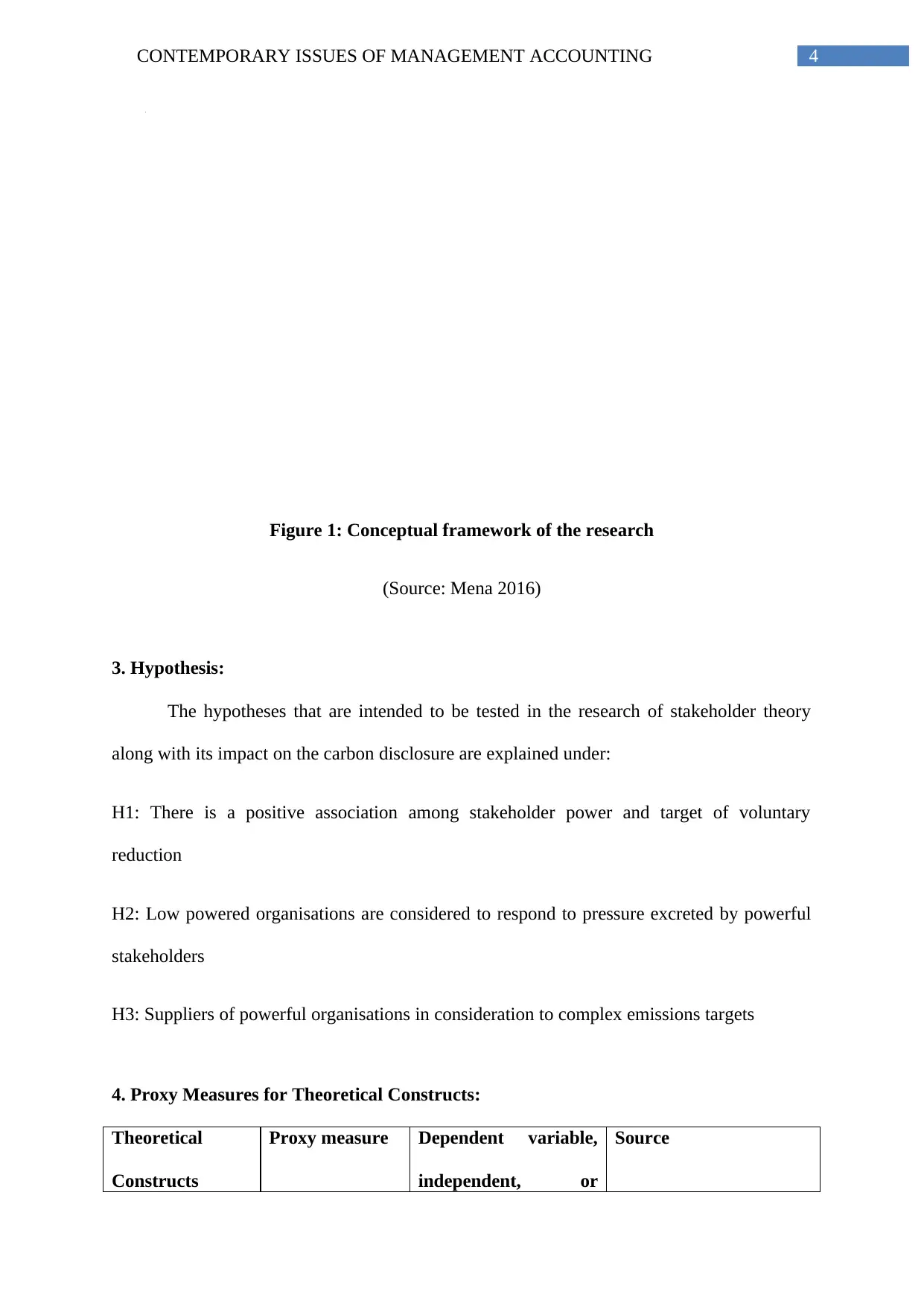
4CONTEMPORARY ISSUES OF MANAGEMENT ACCOUNTING
Figure 1: Conceptual framework of the research
(Source: Mena 2016)
3. Hypothesis:
The hypotheses that are intended to be tested in the research of stakeholder theory
along with its impact on the carbon disclosure are explained under:
H1: There is a positive association among stakeholder power and target of voluntary
reduction
H2: Low powered organisations are considered to respond to pressure excreted by powerful
stakeholders
H3: Suppliers of powerful organisations in consideration to complex emissions targets
4. Proxy Measures for Theoretical Constructs:
Theoretical
Constructs
Proxy measure Dependent variable,
independent, or
Source
TargetofvoluntaryminimisationStakeholderpower
Figure 1: Conceptual framework of the research
(Source: Mena 2016)
3. Hypothesis:
The hypotheses that are intended to be tested in the research of stakeholder theory
along with its impact on the carbon disclosure are explained under:
H1: There is a positive association among stakeholder power and target of voluntary
reduction
H2: Low powered organisations are considered to respond to pressure excreted by powerful
stakeholders
H3: Suppliers of powerful organisations in consideration to complex emissions targets
4. Proxy Measures for Theoretical Constructs:
Theoretical
Constructs
Proxy measure Dependent variable,
independent, or
Source
TargetofvoluntaryminimisationStakeholderpower
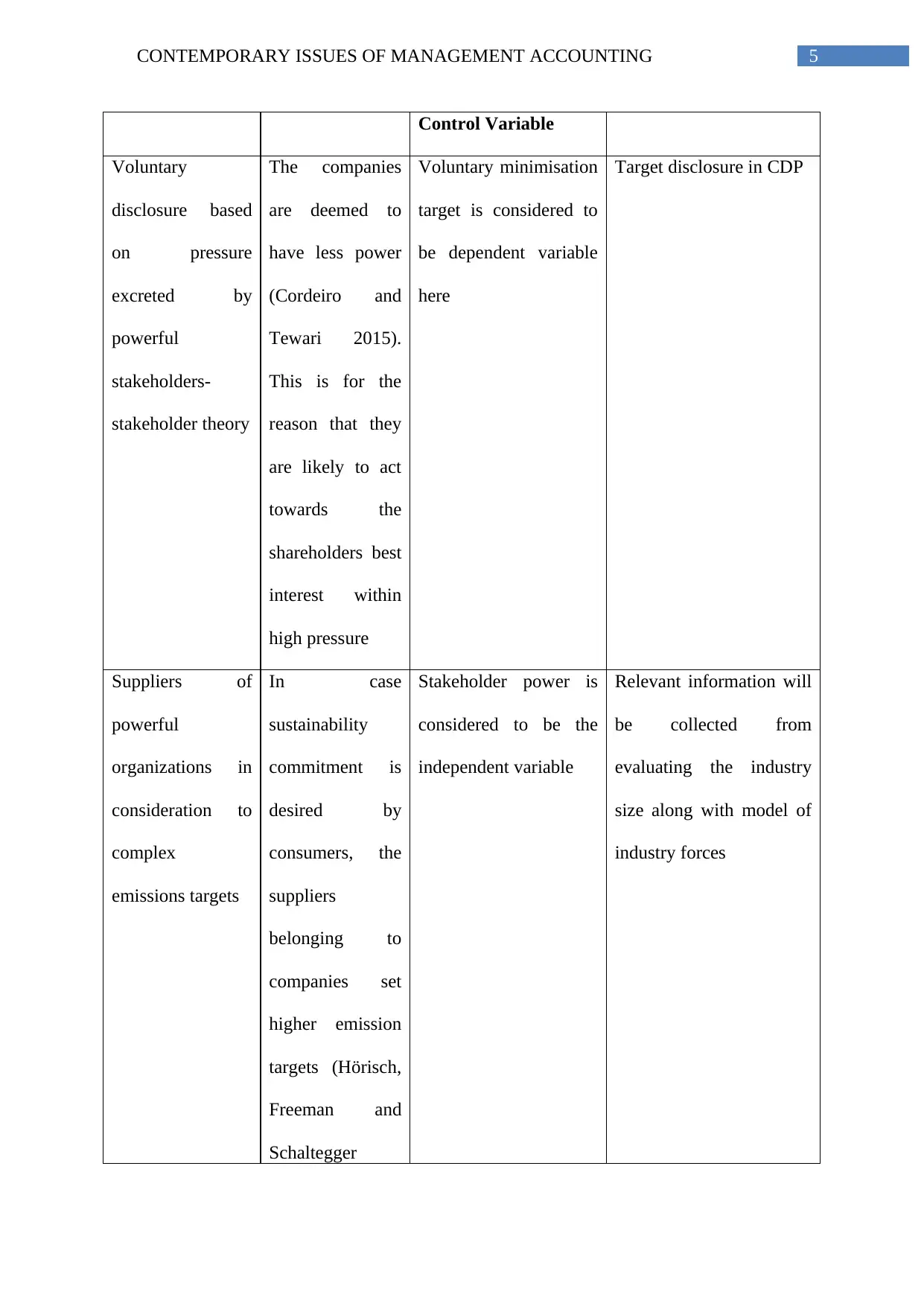
5CONTEMPORARY ISSUES OF MANAGEMENT ACCOUNTING
Control Variable
Voluntary
disclosure based
on pressure
excreted by
powerful
stakeholders-
stakeholder theory
The companies
are deemed to
have less power
(Cordeiro and
Tewari 2015).
This is for the
reason that they
are likely to act
towards the
shareholders best
interest within
high pressure
Voluntary minimisation
target is considered to
be dependent variable
here
Target disclosure in CDP
Suppliers of
powerful
organizations in
consideration to
complex
emissions targets
In case
sustainability
commitment is
desired by
consumers, the
suppliers
belonging to
companies set
higher emission
targets (Hörisch,
Freeman and
Schaltegger
Stakeholder power is
considered to be the
independent variable
Relevant information will
be collected from
evaluating the industry
size along with model of
industry forces
Control Variable
Voluntary
disclosure based
on pressure
excreted by
powerful
stakeholders-
stakeholder theory
The companies
are deemed to
have less power
(Cordeiro and
Tewari 2015).
This is for the
reason that they
are likely to act
towards the
shareholders best
interest within
high pressure
Voluntary minimisation
target is considered to
be dependent variable
here
Target disclosure in CDP
Suppliers of
powerful
organizations in
consideration to
complex
emissions targets
In case
sustainability
commitment is
desired by
consumers, the
suppliers
belonging to
companies set
higher emission
targets (Hörisch,
Freeman and
Schaltegger
Stakeholder power is
considered to be the
independent variable
Relevant information will
be collected from
evaluating the industry
size along with model of
industry forces
⊘ This is a preview!⊘
Do you want full access?
Subscribe today to unlock all pages.

Trusted by 1+ million students worldwide
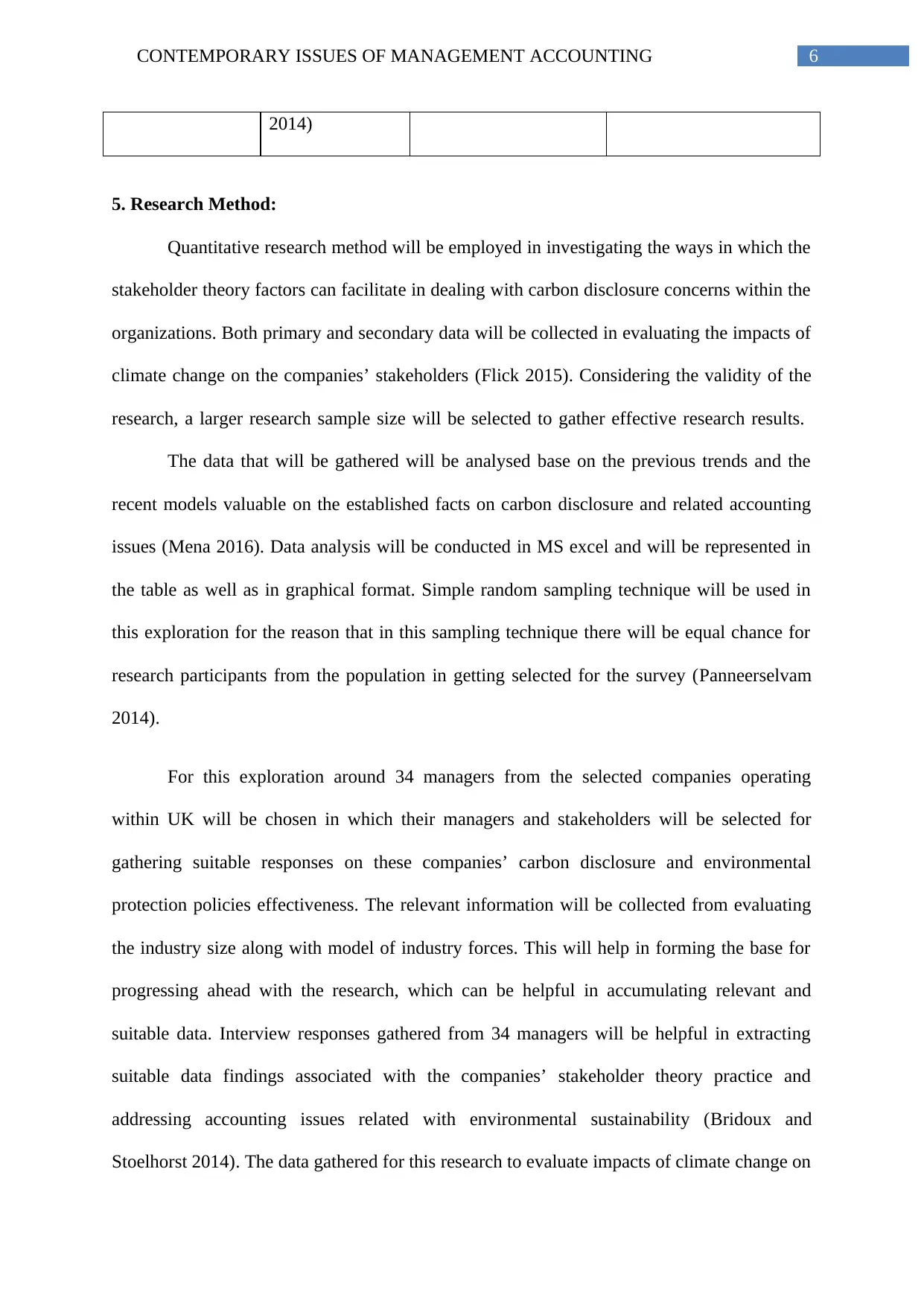
6CONTEMPORARY ISSUES OF MANAGEMENT ACCOUNTING
2014)
5. Research Method:
Quantitative research method will be employed in investigating the ways in which the
stakeholder theory factors can facilitate in dealing with carbon disclosure concerns within the
organizations. Both primary and secondary data will be collected in evaluating the impacts of
climate change on the companies’ stakeholders (Flick 2015). Considering the validity of the
research, a larger research sample size will be selected to gather effective research results.
The data that will be gathered will be analysed base on the previous trends and the
recent models valuable on the established facts on carbon disclosure and related accounting
issues (Mena 2016). Data analysis will be conducted in MS excel and will be represented in
the table as well as in graphical format. Simple random sampling technique will be used in
this exploration for the reason that in this sampling technique there will be equal chance for
research participants from the population in getting selected for the survey (Panneerselvam
2014).
For this exploration around 34 managers from the selected companies operating
within UK will be chosen in which their managers and stakeholders will be selected for
gathering suitable responses on these companies’ carbon disclosure and environmental
protection policies effectiveness. The relevant information will be collected from evaluating
the industry size along with model of industry forces. This will help in forming the base for
progressing ahead with the research, which can be helpful in accumulating relevant and
suitable data. Interview responses gathered from 34 managers will be helpful in extracting
suitable data findings associated with the companies’ stakeholder theory practice and
addressing accounting issues related with environmental sustainability (Bridoux and
Stoelhorst 2014). The data gathered for this research to evaluate impacts of climate change on
2014)
5. Research Method:
Quantitative research method will be employed in investigating the ways in which the
stakeholder theory factors can facilitate in dealing with carbon disclosure concerns within the
organizations. Both primary and secondary data will be collected in evaluating the impacts of
climate change on the companies’ stakeholders (Flick 2015). Considering the validity of the
research, a larger research sample size will be selected to gather effective research results.
The data that will be gathered will be analysed base on the previous trends and the
recent models valuable on the established facts on carbon disclosure and related accounting
issues (Mena 2016). Data analysis will be conducted in MS excel and will be represented in
the table as well as in graphical format. Simple random sampling technique will be used in
this exploration for the reason that in this sampling technique there will be equal chance for
research participants from the population in getting selected for the survey (Panneerselvam
2014).
For this exploration around 34 managers from the selected companies operating
within UK will be chosen in which their managers and stakeholders will be selected for
gathering suitable responses on these companies’ carbon disclosure and environmental
protection policies effectiveness. The relevant information will be collected from evaluating
the industry size along with model of industry forces. This will help in forming the base for
progressing ahead with the research, which can be helpful in accumulating relevant and
suitable data. Interview responses gathered from 34 managers will be helpful in extracting
suitable data findings associated with the companies’ stakeholder theory practice and
addressing accounting issues related with environmental sustainability (Bridoux and
Stoelhorst 2014). The data gathered for this research to evaluate impacts of climate change on
Paraphrase This Document
Need a fresh take? Get an instant paraphrase of this document with our AI Paraphraser

7CONTEMPORARY ISSUES OF MANAGEMENT ACCOUNTING
the stakeholders of the corporate organisations require use of statistical data analysis
techniques for reliable findings.
the stakeholders of the corporate organisations require use of statistical data analysis
techniques for reliable findings.
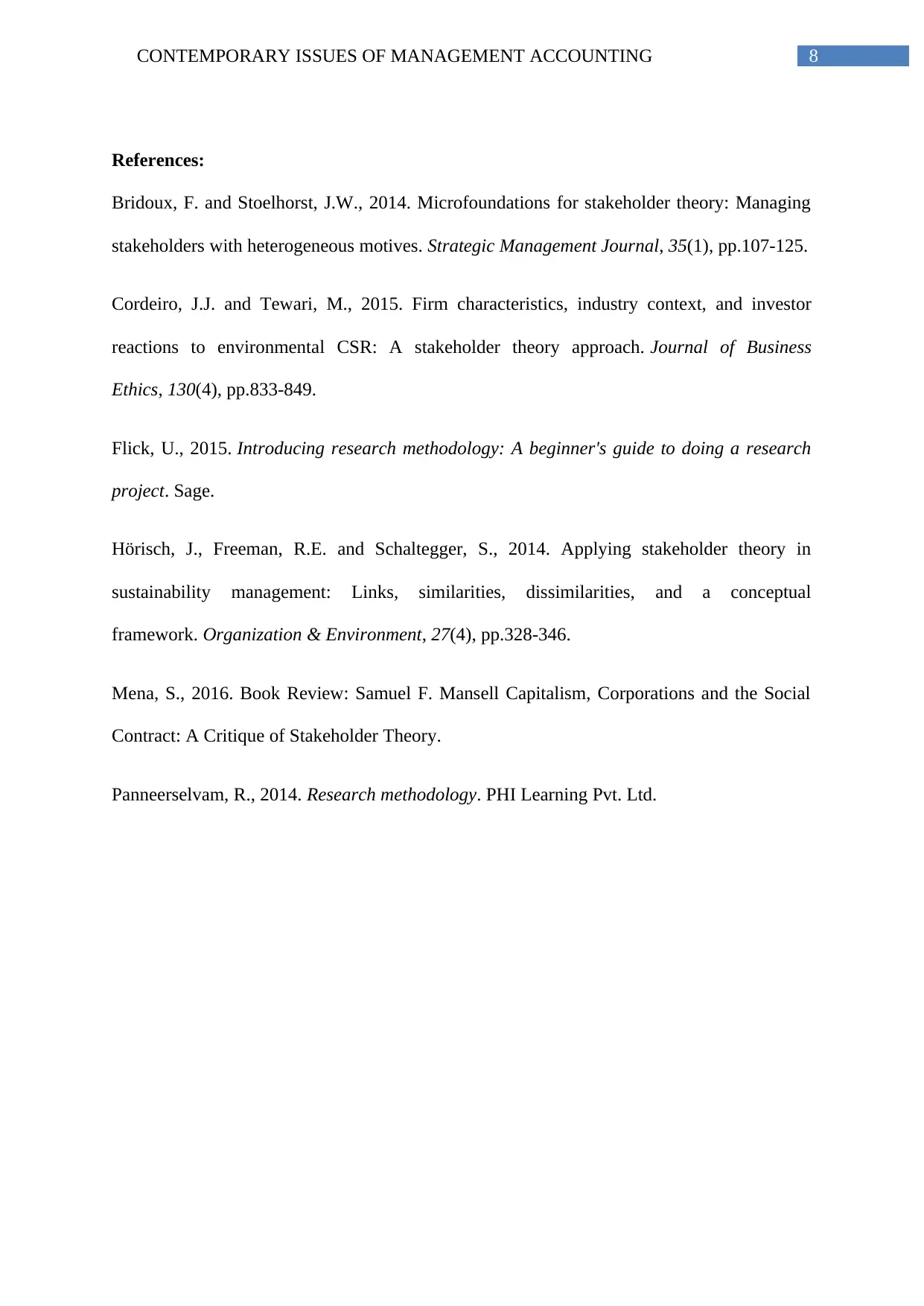
8CONTEMPORARY ISSUES OF MANAGEMENT ACCOUNTING
References:
Bridoux, F. and Stoelhorst, J.W., 2014. Microfoundations for stakeholder theory: Managing
stakeholders with heterogeneous motives. Strategic Management Journal, 35(1), pp.107-125.
Cordeiro, J.J. and Tewari, M., 2015. Firm characteristics, industry context, and investor
reactions to environmental CSR: A stakeholder theory approach. Journal of Business
Ethics, 130(4), pp.833-849.
Flick, U., 2015. Introducing research methodology: A beginner's guide to doing a research
project. Sage.
Hörisch, J., Freeman, R.E. and Schaltegger, S., 2014. Applying stakeholder theory in
sustainability management: Links, similarities, dissimilarities, and a conceptual
framework. Organization & Environment, 27(4), pp.328-346.
Mena, S., 2016. Book Review: Samuel F. Mansell Capitalism, Corporations and the Social
Contract: A Critique of Stakeholder Theory.
Panneerselvam, R., 2014. Research methodology. PHI Learning Pvt. Ltd.
References:
Bridoux, F. and Stoelhorst, J.W., 2014. Microfoundations for stakeholder theory: Managing
stakeholders with heterogeneous motives. Strategic Management Journal, 35(1), pp.107-125.
Cordeiro, J.J. and Tewari, M., 2015. Firm characteristics, industry context, and investor
reactions to environmental CSR: A stakeholder theory approach. Journal of Business
Ethics, 130(4), pp.833-849.
Flick, U., 2015. Introducing research methodology: A beginner's guide to doing a research
project. Sage.
Hörisch, J., Freeman, R.E. and Schaltegger, S., 2014. Applying stakeholder theory in
sustainability management: Links, similarities, dissimilarities, and a conceptual
framework. Organization & Environment, 27(4), pp.328-346.
Mena, S., 2016. Book Review: Samuel F. Mansell Capitalism, Corporations and the Social
Contract: A Critique of Stakeholder Theory.
Panneerselvam, R., 2014. Research methodology. PHI Learning Pvt. Ltd.
⊘ This is a preview!⊘
Do you want full access?
Subscribe today to unlock all pages.

Trusted by 1+ million students worldwide
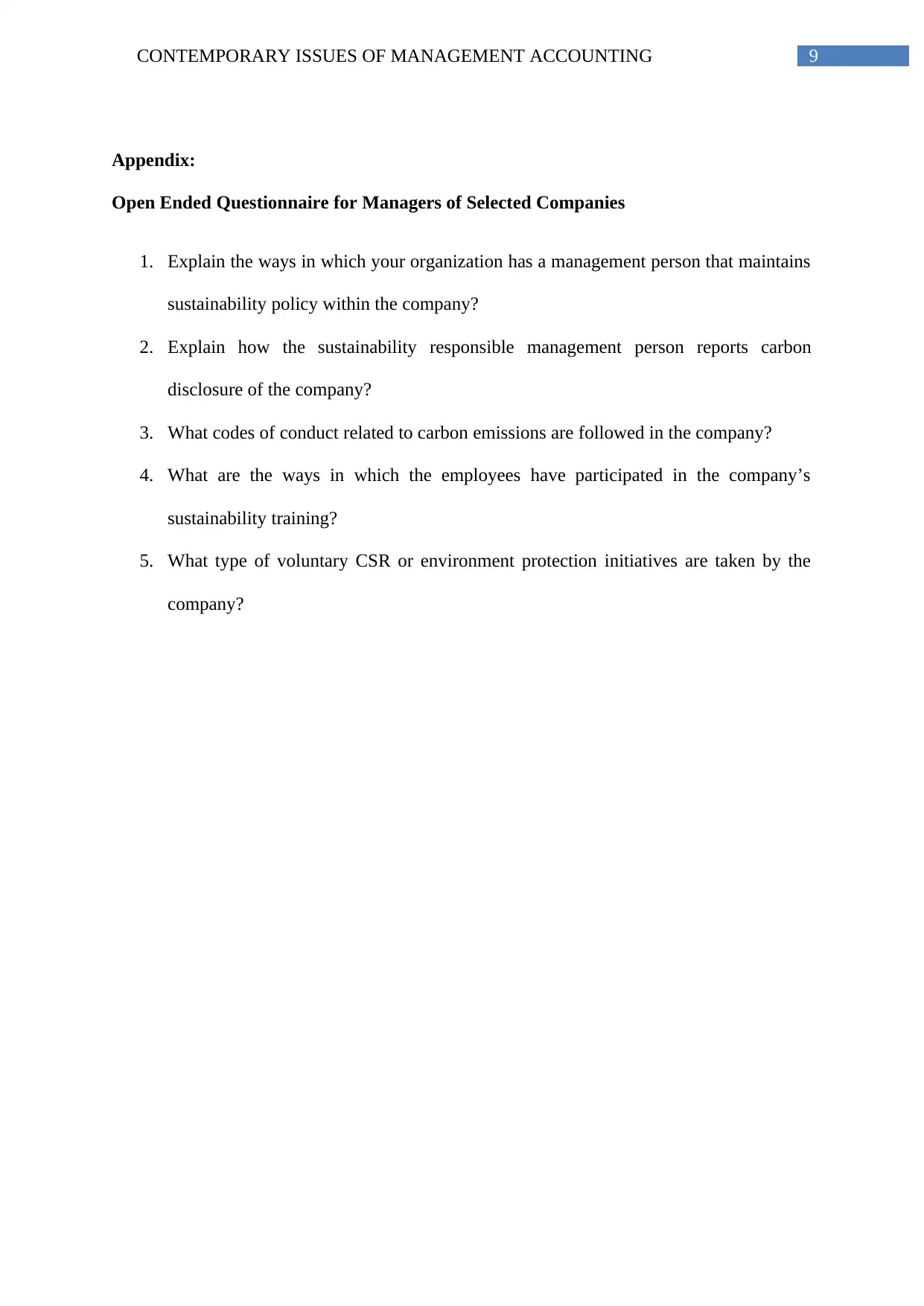
9CONTEMPORARY ISSUES OF MANAGEMENT ACCOUNTING
Appendix:
Open Ended Questionnaire for Managers of Selected Companies
1. Explain the ways in which your organization has a management person that maintains
sustainability policy within the company?
2. Explain how the sustainability responsible management person reports carbon
disclosure of the company?
3. What codes of conduct related to carbon emissions are followed in the company?
4. What are the ways in which the employees have participated in the company’s
sustainability training?
5. What type of voluntary CSR or environment protection initiatives are taken by the
company?
Appendix:
Open Ended Questionnaire for Managers of Selected Companies
1. Explain the ways in which your organization has a management person that maintains
sustainability policy within the company?
2. Explain how the sustainability responsible management person reports carbon
disclosure of the company?
3. What codes of conduct related to carbon emissions are followed in the company?
4. What are the ways in which the employees have participated in the company’s
sustainability training?
5. What type of voluntary CSR or environment protection initiatives are taken by the
company?
1 out of 10
Related Documents
Your All-in-One AI-Powered Toolkit for Academic Success.
+13062052269
info@desklib.com
Available 24*7 on WhatsApp / Email
![[object Object]](/_next/static/media/star-bottom.7253800d.svg)
Unlock your academic potential
Copyright © 2020–2026 A2Z Services. All Rights Reserved. Developed and managed by ZUCOL.





